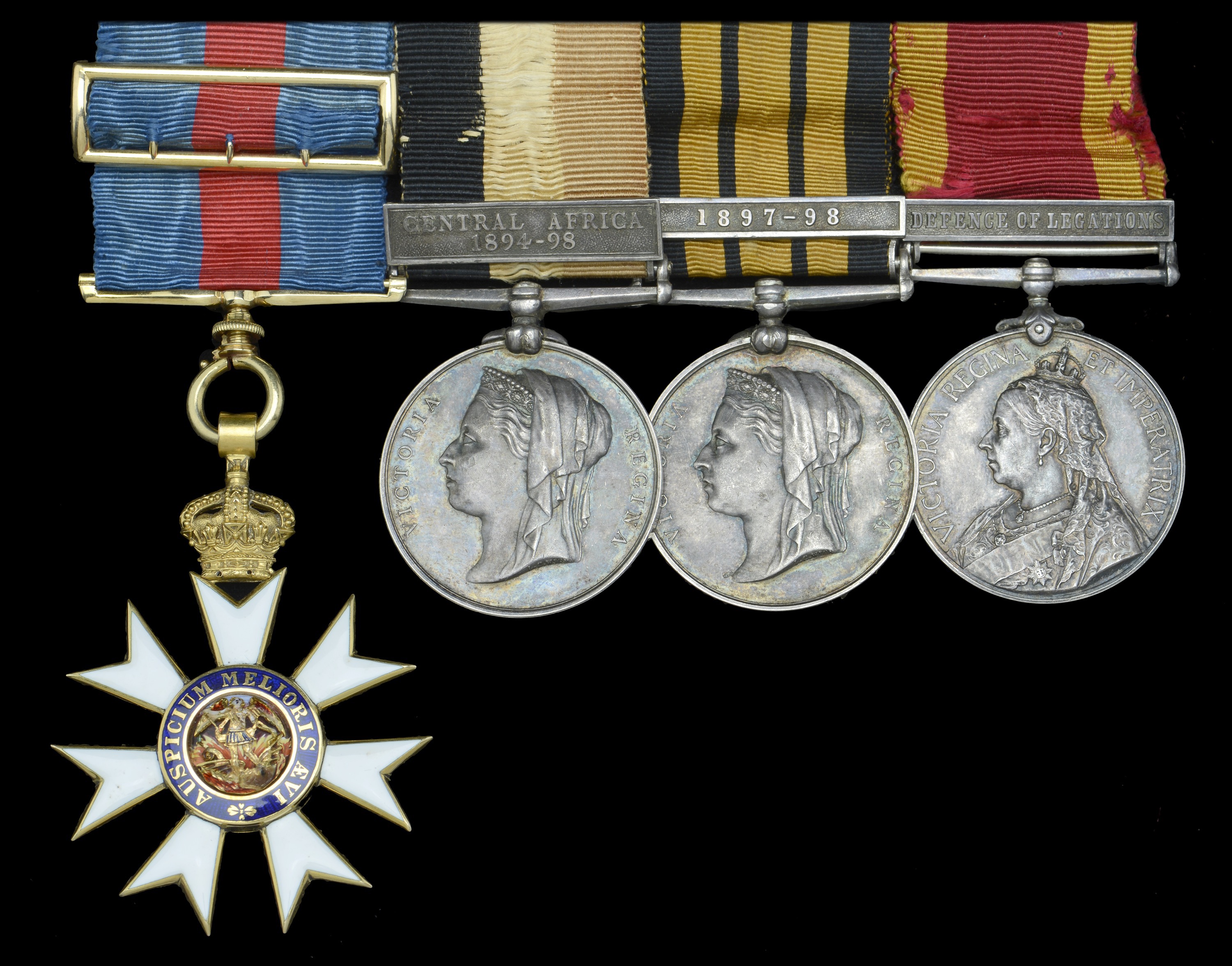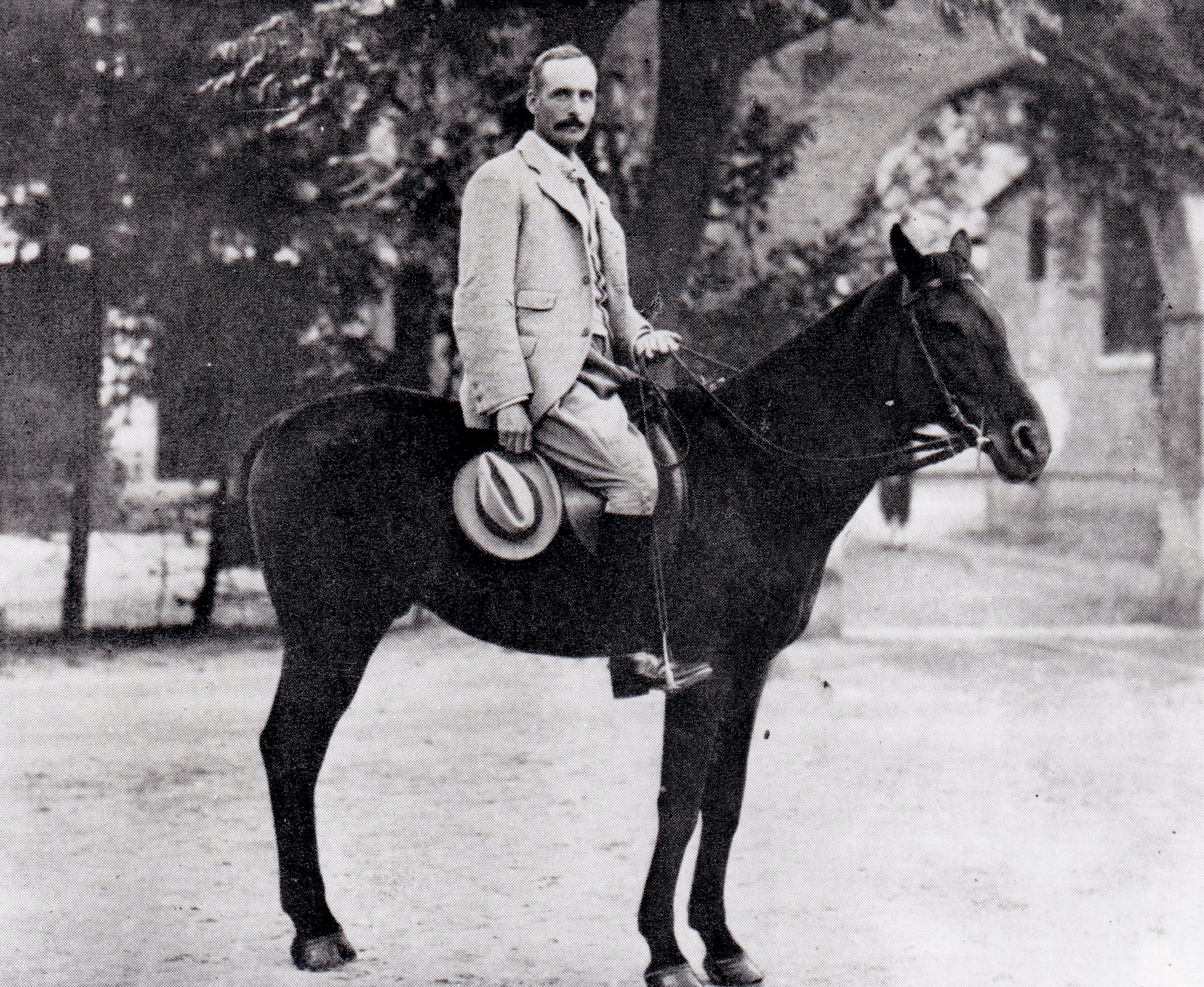The important and unique West Africa 1899 C.M.G. and Defence of Legations group of four awarded to Doctor Wordsworth Poole, Principal Medical Officer in Central Africa 1895-97 and West Africa, 1897-99, who was Mentioned in Despatches for his services as Physician to the British Legation during the Siege at Peking The Most Distinguished Order of St. Michael and St. George, C.M.G., Companion’s breast badge, gold and enamels, with integral gold ribbon buckle, some small chips to the enamel of both centres; Central Africa 1891-98, straight bar suspension, 1 clasp, Central Africa 1894-98 (Wordsworth Poole, P. M. O), officially engraved in upright serif capitals; East and West Africa 1887-1900, 1 clasp, 1897-98 (Dr. Wordsworth Poole, W.A.F.F.), officially impressed naming; China 1900, 1 clasp, Defence of Legations (Wordsworth Poole, M.B., C.M.G., Legation), officially engraved in sloping serif letters, the usual style for officers, the group mounted on a contemporary wearing bar, toned and unless otherwise described, nearly extremely fine (4) £20,000-£26,000 --- Provenance: A. A. Upfill-Brown Collection, Buckland Dix & Wood, December 1991; Dr. A. L. Lloyd Collection, Bonhams, March 2013. C.M.G. London Gazette 2 January 1900: ‘For services as Principal Medical Officer of the West African Frontier Force on the Niger.’ Wordsworth Poole, who was born into a medical family at St. Paul's Cray, Kent, on 7 December 1867, was the son of Samuel Wordsworth Poole, an M.D. of Aberdeen and, later, vicar of St. Mark’s, Cambridge, and the grandson of Richard Poole, an eminent physician, psychiatrist and phrenologist, who practised in Edinburgh. He was educated at St. Olave’s School, London, where he won several scholarships and then proceeded to St. Catherine's College, Cambridge where he entered the medical faculty. Completing his training at Guy's Hospital, and qualifying as an M.B. and B.C.H., he was unimpressed with the humdrum prospects of a provincial G.P., and Wordsworth Poole, after a short time as house surgeon, went forth to play his part in Empire, later jotting: ‘There was a young Cambridge M.B. Said I won't be a Cambridge G.P. But to Africa's shore I'll stick ever more And now he's a K.C.M.G.’ Fortunately for posterity’s sake, during his time in Central Africa, Poole kept a journal and wrote many letters to members of his family. Edited and published circa 1960 by Michael Gelfand under the title ‘Doctor on Lake Nyasa - Being the Journal and Letters of Dr. Wordsworth Poole (1895-1897)’ these writings, often quoted below, provide a rare insight into an important period of British rule in Central Africa, dealing as they do with the final overthrow of the armed forces of the African chiefs and Arab leaders who conducted a huge traffic in slaves around and beyond the shores of Lake Nyasa. They also contain much of interest from a medical perspective and many references to the life led by the early Europeans in the protectorate. British Central Africa On 5 January 1895, Poole was appointed to the Administration of the British Central Africa Protectorate as second Medical Officer. Bidding farewell to his brother, Francis, at Cairo on 19 February 1895 he embarked for Zomba, via Suez, Zanzibar and Mozambique, arriving on 17 April. Upon arrival, he observed in a letter to his Aunt Mary that there was a great mixture of nationalities in the tiny community of Zomba: ‘There are British, Yaos, Atongas, Arabs, Hindi, Goanese, Zanzibaris, Makua from Mozambique, Persians, a jJew, Zulus, Angoni - all speaking different languages’. As was to be expected, Poole at once commenced to treat the sick, one of his first calls was to make an African a wooden leg, his leg having been bitten off by a crocodile. Promotion was swift and, following the resignation of the incumbent, Dr. Rendall, by October he held the post of Principal Medical Officer, on the recommendation of the Commissioner, Sir Harry Johnston, who said of him, he had 'shown himself to be a most capable man and he can stand the climate and likes the country.' Wordsworth’s job was not an easy one, however, involving as it did, leaving his post at a moment’s notice to attend to members of the administration. Malaria and its complication, blackwater fever, were the most serious disadvantages of the country. The mortality rate amongst the officials and settlers must have been one of the highest in the world with an overall annual death rate of around 10 percent. The death rate among officials was particularly high. In 1897-98 there were 81 officials, of whom one-fifth were always on leave. Out of the total of 65 in the country there were 12 deaths (18 per cent), practically all in the prime of their life. Although conditions for the handful of Europeans in the capital were harsh, Poole discovered he could get by set apart from fair-skinned females; his military neighbours, on the other hand, he found rather trying. 'Take them all round,' he wrote, 'soldiers are about the most uninteresting men out - Their calling seems to wash anything original out of them and they become exasperating bores.' However, he enthusiastically entered the social life of the place, becoming secretary of the sports club and building a tennis court. Being of literary interests, he was also the prime mover in establishing a library. In September 1895, Wordsworth Poole took part in the first of several expeditions to suppress slavery on the southern shores of Lake Nyasa. As the expedition approached Chief Matipwiri's village, he was conscious of the ever present dangers ‘It was difficult to get rid of an uncomfortable feeling that some of the enemy lurking in the grass might loose off a gun at you, trusting for his chance of getting away in the long grass, in which they dodge about like hares. This did actually happen, for just as we were setting about to bivouac, three of the enemy fired from the bush, hitting no one but one of them got dropped by two bullets’. Contemplating the forthcoming battle 'I had been thinking all day what I should do when the action commenced,' he imagined himself treating the casualties, with his, 'boy carrying my Winchester to be handy’ in case he should be attacked when attending to the wounded. The reality, however, was somewhat different. The enemy evaporated and, ‘various parties went out burning villages and killing a few folk.’ The following month, enabled by an absence of sickness in Zomba, Poole was thrilled to join Major C. E. Edwards on his campaign against Zirafi, a powerful chief living on a steep and impregnable hill covered with boulders of rock, ‘with people potting at you from good cover.’ The skirmishing en-route was described by Poole in a letter to his mother ‘I and my hospital carriers were passing a clearing when about 70 yards away from us two guns blazed off from behind rocks. The porters threw down their loads and hooked. My boy ran up to me with my rifle, and I was trying to catch sight of someone to fire at (I’m fairly steady with the rifle now) when I saw a flash and some smoke, followed by another, and a bullet fell near my feet, knocking up dust into my face’. They pushed on, intent on punishing the naughty Zirafi, but, on finding the enemy's town abandoned, embarked upon the next stage of the campaign against the wicked Mponda, who in turn gave himself up in fear of the oncoming white men. Poole, meanwhile, was busy in his hospital and had been performing several operations, ‘Last Saturday I took off a man’s hand. He had been shot through the wrist by one of Zirafi’s men about six week’s ago. Since then he has had Tetanus, but recovered at Fort Johnston. He is...






